Russia This Week is a weekly review by the MEMRI Russian Media Studies Project, covering the latest Russia-related news and analysis from media in Russia, the Caucasus, Central Asia, and Eastern Europe.
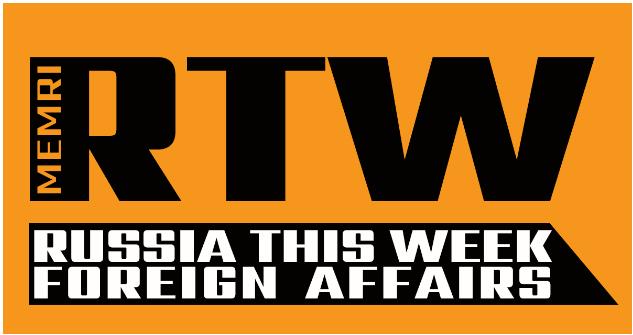
Cartoon Of The Week
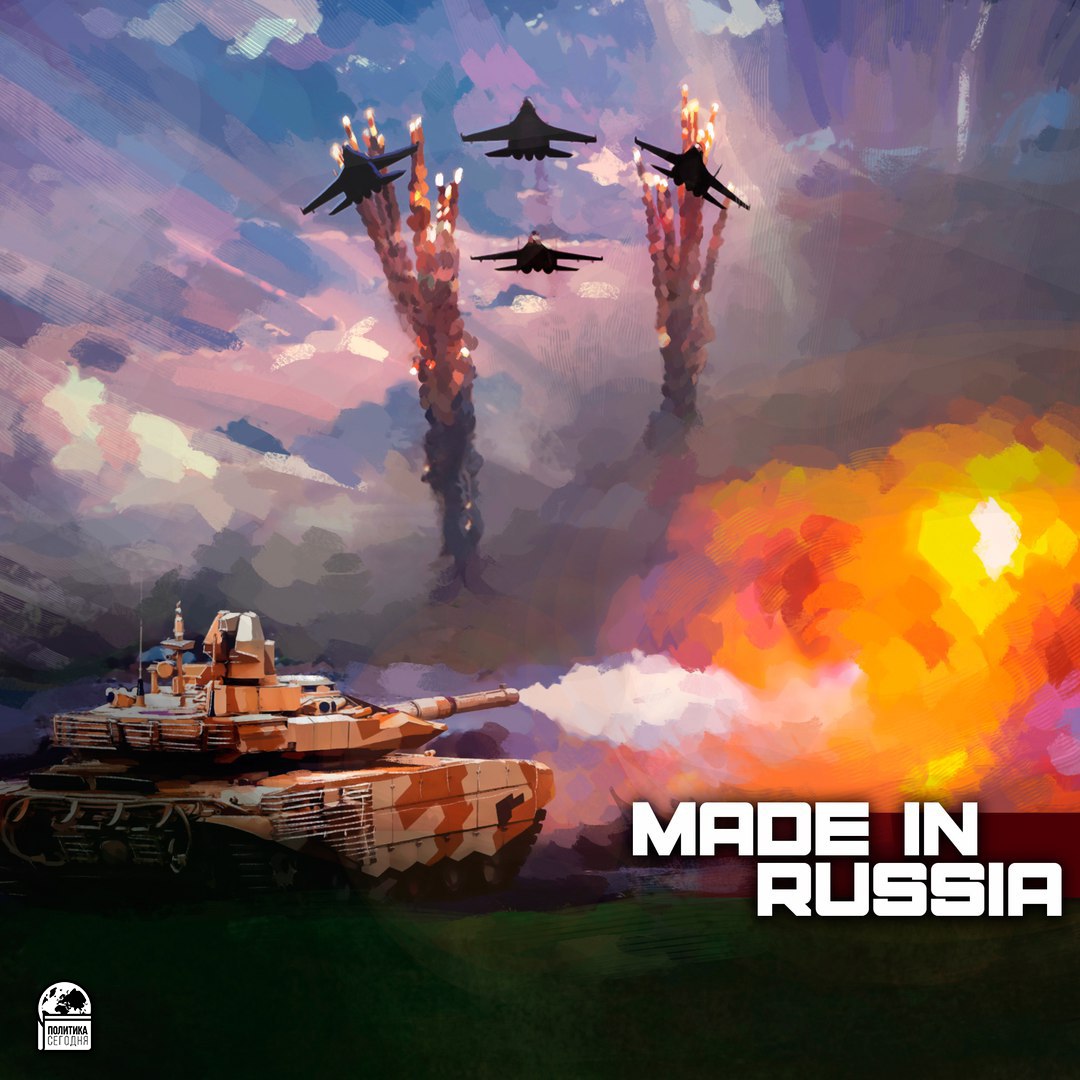
(Source: Vk.com/politics_today, April 22, 2017)
Quotes Of The Week:
Presidential Advisor Sergey Glazyev said:
"The more aggressive the Americans are the sooner they will see the final collapse of the dollar as the only way for the victims of American aggression to stop this aggression is to get rid of the dollar. As soon as we and China are through with the dollar, it will be the end of the United States' military might."
"I had no illusions about [Trump], that he will change the policy. First, America's aggressiveness in the world is rooted in the aspiration to preserve America's hegemony in a situation when they have already ceded leadership in the economy to China."
"The United States has no tools to make all others use the dollar other than a truncheon. That is why they are indulging in a hybrid war with the entire world to shift the burden of their debts onto other countries, to confine all to the dollar and weaken territories they cannot control."
"In this context, the anti-Russian hysteria and growing Russophobia can be seen as a long-term factor linked with the specific interests of the United States' ruling elite."
"In objective terms, they are conducting a global hybrid war and in subjective terms, this war is aimed against us. More to it, as it always happens when a global leader is changed, the war is for control over rimland nations. In the period of WWI and WWII, Britain acted as a provoker in a bid to keep its global leadership. Now the United States is doing the same. And Trump expresses these interests."
(Tass.com, April 21, 2017)
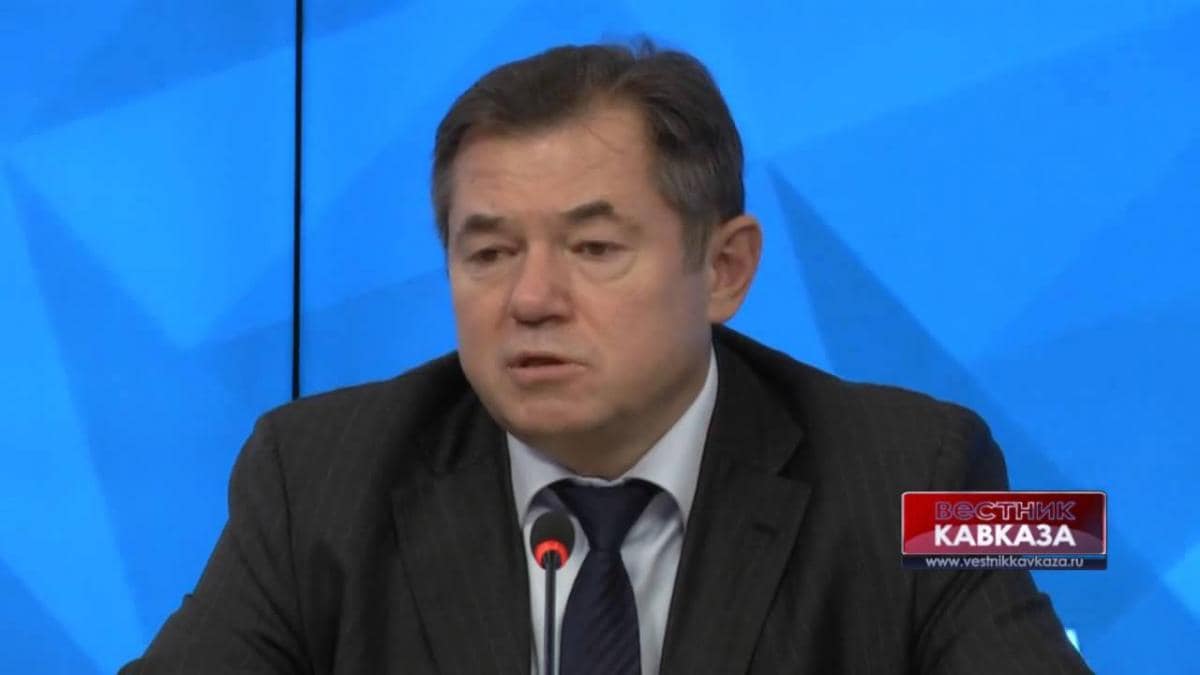
Sergey Glazyev (Source: Youtube.com)
In The News:
General Director of Russia's Political Information Center: The U.S. Influenced Russia's 2016 Duma Elections
The General Director of Russia's Political Information Center, Aleksei Mukhin, said there is evidence that the U.S. influenced Russia's 2016 Duma elections. Mukhin said: "As my colleagues have pointed out quite fairly, the problem is far bigger than attempts at meddling in the 2016 election process. My center has identified direct traces of such interference and very serious and deep ones.
"As soon as Russia took the trouble of looking into the activity of some non-governmental organizations in its territory and adopted laws restricting that activity [it happened during preparations for the 2016 State Duma elections] it became clear that the United States had taken measures to create special units, including those within its armed forces, secret services, government agencies and also non-governmental organizations, for direct information confrontation with Russia. [In particular] the number of centers producing anti-Russian content, addressed mostly to the Russian-speaking audience, was increased [Mukhin refers to Voice of America, Radio Liberty radio stations, and the commercial U.S. television network CNN]. At the legislative level [in the United States] strategies of causing resistance to Russian information policies have been enhanced at the legal level. Their implementation is a sure way towards intervention in Russia's internal affairs."
(Tass.com, April 18, 2017)
http://tass.com/politics/941917
Russia In Syria
'Izvestia': Russia Will Never Join The Western Coalition Led By The U.S.
According to Pro-Kremlin daily Izvestia, Russia will never join the Western Coalition led by the U.S. in Syria. Quoting two unidentified diplomatic sources, Izvestia wrote: "Moscow will never join a coalition under American auspices. We have explained that to our partners behind closed doors. We argue that their actions in Syria are illegitimate. They indeed proposed that we join them, but under the main condition that the U.S. leads the cause of the fight against terror. We are likewise unwilling to do so... If some coalition receives UN Security Council [approval] for action in Syria, we'll consider it, but it will be a completely different formation [as opposed to the current coalition]."
(Izvestia.ru, April 20, 2017)
PM Medvedev: The U.S. Fight Is Not Against Terrorism But Against The Syrian Government
Responding to Duma members' question, during the presentation of the government's annual report, Russian Prime Minister Dmitry Medvedev said: "During the election campaign, our American partners called for combating the so-called Islamic State saying that it did not matter what the political regime in Syria was because the war on terror was the main goal. But what do we see now? The first step the new U.S. administration took concerning Syria resulted in a strike on the government troops. It means, their fight is not against terrorism but against the Syrian government."
Medvedev also stressed that that U.S. strike in Syria was "an act of military aggression." He then added: "The Americans used force without UN permission thus violating international law. This was an act of military aggression. We do not know what will happen next, but the Islamic State has surely benefited from the aggression because it actually gave them free rein to continue their rampage."
(Tass.com, April 19, 2017)
Mikhail Ulyanov, director of the Russian Foreign Ministry's Department for Nonproliferation and Arms Control, said: "It appears to us that the West, mainly the United States, work hand in hand with terrorists. They have fabricated the whole story [of the chemical attack in Khan Shaykhun] in order to have a reason to attack."
(Pravdareport.com, April 20, 2017)
FM Lavrov: Allegations Of Damascus Using Chemical Weapons Is A Ploy For 'Regime Change'
During a meeting with China's Foreign Minister Wang Yi, Russian Foreign Minister Sergey Lavrov said that the rejection of the Russian-backed plan for an investigation into the chemical attack in Khan Shaykhun shows that the existence of a Western ploy for regime change in Syria. Lavrov said: "Our joint proposal that experts from the Organization for the Prohibition of Chemical Weapons (OPCW) should visit the scene of the purported incident where chemical weapons had been supposedly used was blocked by Western delegations without any clear explanations." He then added: "[This showed] a complete fallacy of the stance of our Western colleagues… I think that this is a very serious situation, because it is evident now that the false information about chemical weapons use by the Syrian state is being used to avoid enacting resolution 2254 that stipulates a political settlement. Instead, there is a move towards the long-standing plan for regime change. I'm certain that we must prevent it."
(Tass.com, April 21, 2017)
Lavrentiev To Tehran To Discuss Syria
On April 27, Russia's special envoy on Syria, Alexander Lavrentiev, is scheduled to travel to Tehran to discuss together with Secretary of Iran's Supreme National Security Council Ali Shamkhani, political, military and security solutions for the Syrian crisis.
SUPPORT OUR WORK

(Trend.az, April 26, 2017)
Russia-NATO Relations
Montenegrin Membership In NATO
Deputy Foreign Minister Alexey Meshkov was asked to comment on Montenegro's membership in NATO, during an interview with the Russian news agency Interfax:
Q: "Given that Donald Trump approved Montenegro's membership in NATO and that the Montenegrin parliament will hold a vote, on April 28, on the country's accession to the alliance, do we think that this is a threat to Russian security? How does Moscow assess this and what measures are being prepared?"
Meshkov: "It is no secret and it was repeatedly stated that the most important issues in the life of this or that country should be decided by their peoples. This is what the democratic process is all about. In this case, it is the Montenegrin people's right to decide in a referendum whether they want their country to join NATO or not.
"As far as our relations are concerned, not only their accession to NATO as such but also a number of steps taken by the Montenegrin leaders – that they joined the anti-Russian sanctions and the anti-Russian smear campaigns in the local media – are certainly having and will inevitably have a negative effect on the entire range of Russia-Montenegro ties."
(Mid.ru, April 24, 2017)
Stationing Of NATO Troops Close To The Russian Border
In another question, Meshkov mentioned that the stationing of NATO troops within 100 kilometers of the Russian border can be compared to the preparations for a foreign military intervention during the 1917-1921 civil war in Russia (when American, British, French, Czech and Japanese troops intervened in the fighting on behalf of the Whites).
Q: "Ahead of the next NATO summit in May, what remarks would you make concerning NATO's advance towards Russian borders and the stationing of the NATO military, specifically a contingent from Germany, within 100 kilometers of the Russian border for the first time since the end of World War II? How far is Russia ready to go in its response to these steps?"
Meshkov: "As we look at NATO's multinational military preparations close to our borders, we involuntarily recall the events that happened 100 years ago, when preparations were being made for a foreign military intervention during the Civil War in Russia. Of course, we live in a different world today, but our Western colleagues should remember that the main threat to international security comes from our common enemy, international terrorism."
(Mid.ru, April 24, 2017)
Russia Reacts To Albanian PM's Statement On Greater Albania
Recently, Albanian Prime Minister Edi Rama said that "a union between Albania and Kosovo" cannot be ruled out if EU membership prospects for the Western Balkans fade.
See full interview with Albanian PM Edi Rama published by POLITICO.eu
The Russian Foreign Ministry reacted as follows: "A series of recent statements by various Albanian politicians regarding the redrawing of borders in the Balkans have raised particular concern. We assert that, under the guise of unfounded accusations of attempts to destabilize southeastern Europe aimed at Russia, efforts are being made to implement the Greater Albania project, now based on the Albanian constitution, which gives Tirana the right to defend the interests of Albanians abroad. Under the guise of hypocritical talk about the need to stabilize the region under the NATO umbrella, the very foundations of stability are being shaken; a new policy course has been adopted to redraw the borders in the Balkans, which will inevitably increase the conflict potential.
"Such is the context for the statements by Albanian Prime Minister Edi Rama and the 'head' of the self-proclaimed independent Kosovo Hashim Thaсi on their readiness to join forces in a single Greater Albania state. These statements were echoed by Jonuz Musliu, the head of the south Serbian municipality of Presevo Valley, mainly populated by Albanians, who announced the region's will to become part of the enlarged state. Part of the same context is the notorious Tirana Platform adopted by the ethnic Albanian parties in Macedonia and undermining its statehood.
"Indicatively, the main patrons of Tirana and Pristina – the United States and the EU – either remain timidly silent or issue common meaningless phrases. We cannot help but agree with the assessments of the events voiced by the Serbian Prime Minister, President-elect Aleksandar Vucic and Foreign Minister Ivica Dacic, who resolutely condemned the Albanian politicians' rhetoric and demanded an adequate response to what is happening from Brussels, Washington and key European countries. The bitter irony is that, as Mr. Vucic noted, if he allowed himself to publicly suggest uniting Serbia with Republika Srpska (Bosnia and Herzegovina), he would 'hang from a flagpole' in Brussels.
"We think it is necessary for the international community to jointly point out to Tirana and Albanian politicians in other Balkan countries that making territorial claims and speculating about redrawing borders is unacceptable. We call on our Western partners to abide by international law and common sense, but refrain from applying double standards as they sometimes tend to do."
French Presidential Elections
The Russian news agency Tass published an overview of the Russian media's comments on the results of the first round of voting of the French presidential elections and on the two candidates who advanced to the second round – pro-European Emmanuel Macron, the centrist En Marche! leader, and euro-skeptic Marine Le Pen, leader of the far-right National Front.
Sergey Utkin, Head of the Strategic Assessments Department at the Institute of World Economy and International Relations, told Kommersant: "Emmanuel Macron's victory would mean maintaining the existing policy, including the Russian one. However, we need to take a very important factor into account. Macron will have to seek support from leading French political parties, but the France's political environment is far less critical of Russia than some other EU member-countries. Mr. Macron will have to become a representative of this environment."
(Tass.com, April 24, 2017)
Before the first round of voting, Yevgenia Obichkina, a professor in the International Relations and Foreign Policy Department at the Moscow State Institute of International Relations, told Tass that center-right candidate Francois Fillon would have been the best French presidential candidate for Moscow.
Obichkina said: "At the same time, relations between Russian and the European Union would still continue to go through ups and downs even if Russian-French relations improve thanks to Putin and Fillon. It is never possible to achieve perfection in everything."
(Tass.com, April 21, 2017)
See MEMRI Special Dispatch No. 6886, French Elections Seen From Russia, April 21, 2017.

Second round of the French presidential elections: Emmanuel Macron Vs. Marine Le Pen. (Vitaly Podvitsky, Ria.ru, April 24, 2017)
The Undiplomatic Diplomat's Russian Slang
On April 12, Vladimir Safronkov, Russia's deputy permanent representative to the UN, lost his temper while publicly taking Britain's UN Ambassador Mathew Rycroft to task, at a vote over Syria.
The English-language media outlet The Moscow Times recently wrote:
"The brouhaha was not because one delegate yelled at another delegate — that happens dozens of times every day. And it wasn't because of the nature of Safronkov's accusations —everyone has heard Russia's version of the Syrian war a million times. No, the скандал (scandal) was over the way Safronkov spoke to his esteemed British colleague. Officially it was called достаточно жестко (sufficiently harsh). Unofficially it was called everything from грубое панибратство (crude over-familiarity) to приблатнённое хамство (obnoxious thug slang)...
"You wouldn't know this from the official transcripts, which cleaned up Safronkov's language, primarily switching his familiar, street-talking ты to the more decorous and collegial вы. So he didn't actually say: Посмотрите на меня и не отводите глаза (Look at me and don't look away). He said: Посмотри на меня! Глаза не отводи! Чё ты глаза отводишь? (Hey, look at me! At me, I said! Where you looking?) And he didn't end his tirade with the strong but literary: Не смейте, г-н Райкрофт, больше оскорблять Россию! (Don't you dare, Mr. Rycroft, insult Russia again!) He continued to use ты: Не смей оскорблять Россию больше! (Yo, quit putting Russia down!)."
(Themoscowtimes.com, April 21, 2017)
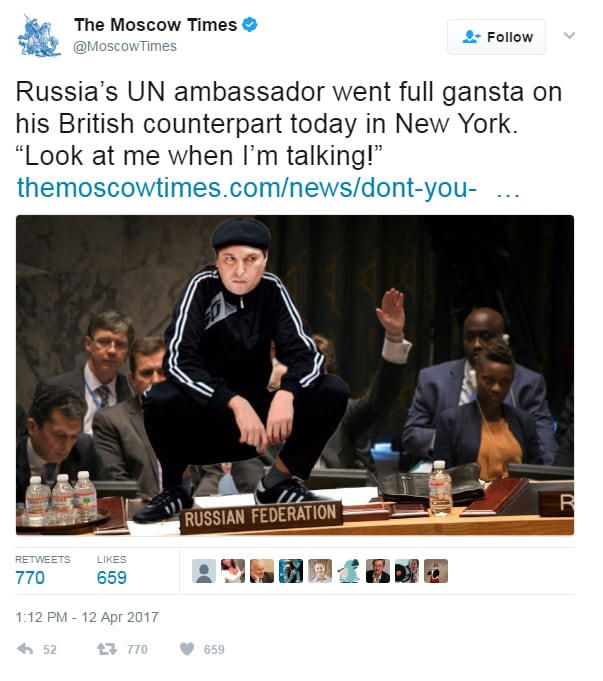
(Twitter.com/moscowtimes, April 12, 2017)
Russia-EU Relations – FM Lavrov: 'Our Relations Are Still Not Systemic, But We Very Much Want All These Artificial Barriers To Be Removed'
On April 24, the EU's High Representative for Foreign Affairs and Security Policy Federica Mogherini visited Moscow. During a joint conference, Russian Foreign Minister Sergey Lavrov said:
"With regard to the sanctions, this topic surfaced in our conversation. As you may be aware, we ourselves never initiate this discussion, but it surfaced predictably, because, as you rightly noted, it is part of those artificial issues that accumulate in our relations with the European Union. Federica Mogherini said an interesting thing to the effect that the EU wants everyone to comply with the Minsk agreements. "Understandably, this includes the Kiev government, the self-defense forces in Donetsk and Lugansk, and the European Union, because Germany and France have, by and large, acted on behalf of the EU, all the more so since all these agreements were approved by the UN Security Council. If these agreements are to be implemented by everyone, then probably Russia should convince Lugansk and Donetsk, who put their signatures under the Minsk agreements, to constructively and fully fulfil their part of their obligations, whereas Germany and France must ensure that the Ukrainian government does the same. We strive to do our part of the deal well, but, unfortunately, Kiev is avoiding a direct dialogue with Donetsk and Lugansk, although it is mentioned in black and white in the Minsk documents.
"In turn, we discussed how our European colleagues work with Kiev. If Federica Mogherini wishes to do so, she will tell you what Brussels is doing in order to have Kiev fulfill its commitments. If the EU's position is that everyone should fulfill their share of the obligations, then why are the sanctions imposed on Russia alone? The obvious sabotage by Kiev of everything that is written in the Minsk document should have some response on behalf of those who have taken this government under their wing.
"Since Federica Mogherini said the word 'Crimea,' I will mention, in parentheses, that Crimea is part of the Russian Federation in full accordance with the will of the people of Crimea. I have not heard EU challenging statements made by numerous British prime ministers when it came to the Falkland Islands (Islas Malvinas). At all times, whenever the UN General Assembly issued a resolution to Great Britain to the effect that Argentina and Britain need to sit down and talk, London invariably said that no one can challenge the right of the people of the Falkland Islands to self-determination. We are asking for at least the same attitude towards the people of Crimea who are much closer to Russia.
"With regard to auditing relations between Russia and the EU, we proposed not just auditing them, but taking stock of them. Audit in Russian means a slightly different thing than the English term 'review.' A little less than a year ago a paper came up, and today we saw that it is part of a dossier that the delegation brought to Moscow. We expect that this paper will continue to be scrutinized and that the answer will come and be based on the practical interests of our partners rather than the ideological biases of individual EU members.
"Federica Mogherini now said that we share many common interests with regard to cooperation in solving international problems, and gave a list of them, which includes the Middle East, North Africa, the Palestinian problem, Afghanistan, the Korean peninsula, the climate, and much more. We also agree that these are common problems and it is important to join our efforts in finding a solution to all these international issues.
"Why don't we let our imagination run free and imagine that we have resolved all these issues, the situation around Russia and the EU calms down, and find ourselves stuck in an interesting situation where we are neighbors, and the advantages of our interaction are clear to everyone, especially in today's highly competitive era. So, everything will be settled, but we won't be partners. I'm not even sure what to call such relations. We also discussed this.
"The Foreign Policy Concept of the Russian Federation states that we reiterate our interest in a strategic partnership with the EU. We failed to find the word 'partnership' in EU's new document on foreign policy, which was adopted last year just like our concept. It used to be there before. Now it says that the development of relations with Russia is a 'challenge' for the EU. I'm trying to ponder this subject. The Brussels policy to 'freeze' relations between us and to keep them that way (in an attempt to 'punish' us for the people of Crimea exercising their free will) and at the same time to cooperate with us in order to resolve international issues looks half-hearted and ambiguous. The issue is not about what we are going to do in a particular region of the world. It is important, but, in the interests of our respective peoples, it is imperative to answer the questions of how we are going to live side by side, and whether we will seek compromises or try to impose our point of view on our partners?
"The ideological dispute has taken on a new dimension in Europe. The values are being interpreted differently. We do not want Russia to be drawn into that dispute. We wish the European Union could reach a consensus within individual countries and in Brussels so that the EU is united and strong, and no domestic games divert the European Union from maintaining partnerships, including with the Russian Federation.
Our relations are still not systemic, but we very much want all these artificial barriers to be removed and give way to a normal, honest and mutually respectful dialogue based on facts, rather than fleeting interests driven by ideology."
(Mid.ru, April 24, 2017)
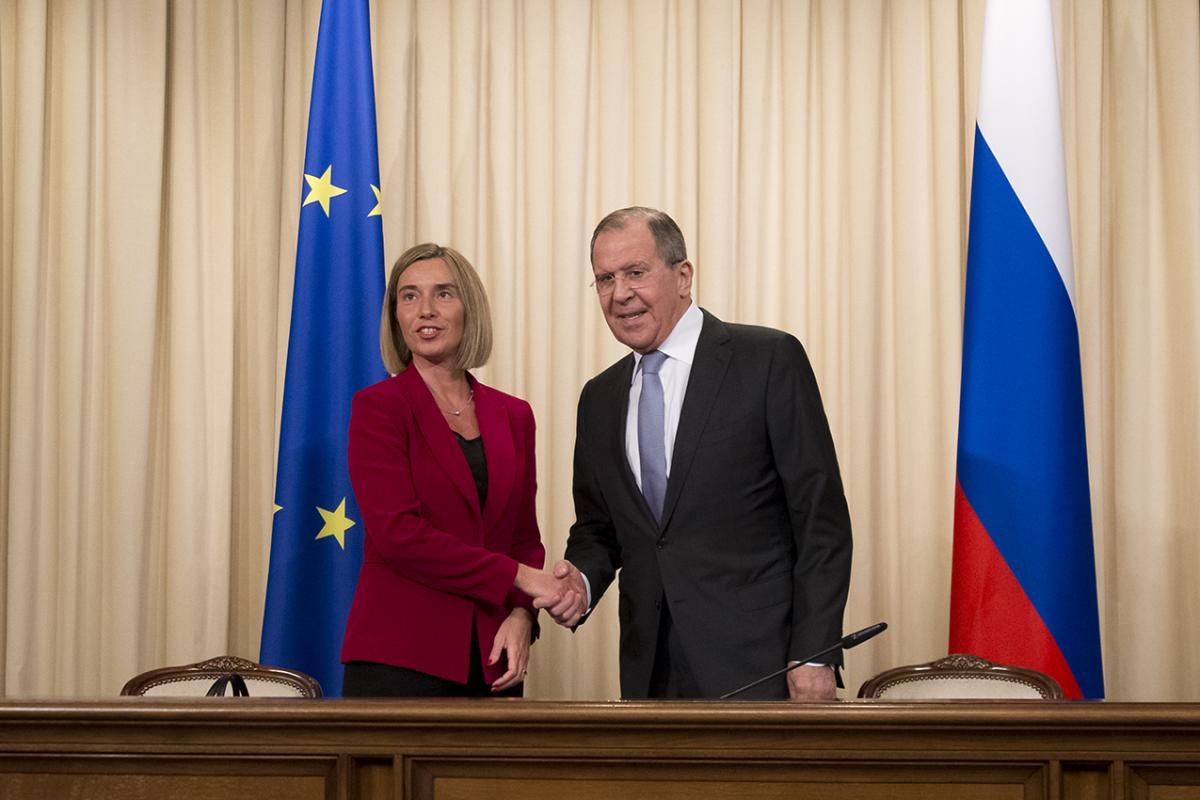
Mogherini with Lavrov (Source: Mid.ru)
Russia –Turkey Trade War
According to economic experts trade barriers imposed by Turkey on Russian grain and other products may damage the Russian economy by $1.3-1.5 billion per annum. The ban imposed earlier by Russia on Turkish tomatoes following the downing of the Russian jet in Syria, inflicted annual losses of roughly $350 million on the Turkish agricultural sector. The trade war between the two countries has recently resumed, as Russia did not lift its ban, contrary to expectations by Turkish agriculture producers, following a reconciliation process between the countries.
(Vedomosti.ru, April 17, 2017)
Russian Minister of Agriculture Alexander Tkachev deemed the Turkish decision to impose customs duties on Russian grain exports to be "a stab in the back". Tkachev said: "Our export to Turkey amounts to 10% (of production) – this is a painful blow, but I don't mean we can't survive without Turkey. The government's position: we do not intend to open the tomato markets [for foreign imports]."
(Rbc.ru, April 19, 2017)
See MEMRI Special Dispatch No. 6860, Russia This Week – March 30-April 6, 2017, April 6, 2017.




